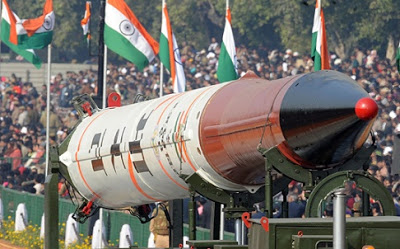Kanica Rakhra of Jawaharlal Nehru University writes for EA:
Since 1968, when the Nuclear Non-Proliferation Treaty was inaugurated, an Asian State has consistently opposed the unfair terms of the treaty. It has pursued an atomic bomb amid regional tensions and precarious relations with its neighbors. It also managed to use its capability to bolster a national identity tied to “security” and to achieve the goal of being a power of significance.
This State is not Iran, which is a signatory of the NPT. It is India, which is not.
So why is it that Iran, for decades, has been scrutinized and castigated while India has not only escaped stricture but has been given tacit support for its nuclear program?
One explanation could be not in any formal mechanism in the global system, let alone the NPT, but in the informal consideration of “behavior”.
India and Iran have both been sanctioned in the past for their nuclear behavior. India. after its first ‘peaceful’ explosion in 1974 and after weaponization in 1998 and Iran during the better part of 2000s. However, Delhi was able to weather the immediate economic punishment, as it proved that its nuclear development would not lead to malign use. Soon, the sanctions ebbed, replaced by an acceptance of India’s arsenal. Even the 2002 crisis with Pakistan, which threatened war, did not unsettle this de facto arrangement: India might not be in the NPT in practice, but it was considered an adherent in principle.
At one level, the Islamic Republic can also be said to have promoted adherence to no use of a bomb: after all, current Supreme Leader Ali Khameini issued a fatwa against nuclear weapons in 2005 and the leader of the revolution, Imam Khomeini also rejected nuclear weapons stating them to be incompatible with Islam. The State has not crossed any legal boundaries of the treaties it has signed. While flexing its muscles within the parameters of the treaty, it has not left the framework of the NPT or set it aside.
However, that is far from sufficient for Iran to be given the leeway accorded to India. Why?
“Behavior” is set within a geo-political arena where States shroud their decisions in the garb of security. India’s nuclear decision is showcased as a response to the Chinese and Pakistani security threat, while Iran’s nuclear ambition can be considered a retort to the covert Israeli nuclear program and the growing threat of one by Saudi Arabia.
However, because Iran has been put in the “offensive” position — or put itself in that position, depending on your viewpoint — the implicit understanding that was provided to India could not be replicated in Iran. Delhi has been able to support its portrayal of a bomb for security through its behavior in the international arena, from proclamation of a zero-proliferation record to respect for international borders, over four decades. It has built a “trust” beyond formal standards.
With the self-imposed deadline of June 30 approaching, Iran and the 5+1 Powers are trying to reach their own formal accord. Tehran now says it will adhere to the Additional Protocols of the NPT and support inspections of its nuclear facilities, if not its military sites.
Yet, even in the negotiation of a final text, India’s lesson of “trust” demonstrates the problems of relying only on formal agreement. The concerns expressed by both sides turn more on behavior rather than the letters of the deal — Iran says interrogations of its nuclear scientists could be used for Western espionage and even endanger its physicists, and the US insists on “snap-back” provisions to re-impose sanctions because Tehran might cheat on the terms of the agreement.
For all the details in an agreement and annexes of more than 60 pages, the significance of the deal begins with the symbolic. It is a starting point for Iran’s behavior to be considered reliable rather than devious, civil rather than military, realistic development rather than existential threat. But it could take all 10 or 15 years of that agreement for the Islamic State to approach the trust which is afforded to the Indian nuclear power.
Kanica Rakhra is a PhD candidate at The Centre for International Politics, Organization and Disarmament (CIPOD) at Jawaharlal Nehru University. She also handles the blog and other social media outlets of the International Society for Political Psychology (ISPP) as a Junior Scholar Committee Member.

